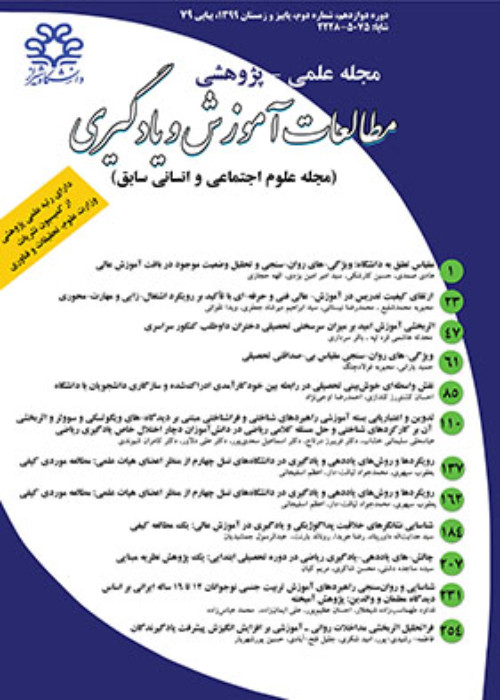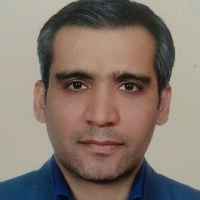Designing an Integrated Framework to Evaluation of Academic Achievement for the Secondary Schools in Islamic Republic Of Iran: A Qualitative Study
Author(s):
Article Type:
Research/Original Article (دارای رتبه معتبر)
Abstract:
Introduction
Evaluation plays a vital role in instruction. Assessment and evaluation are fundamental components of teaching and learning. Assessment is the process of collecting and documenting information on individual student learning, while evaluation is the process of analyzing, reflecting, summarizing and making decisions based on this information. The purpose of assessment is to inform teaching and improve learning. Hence, assessment of learning and assessment for learning are integral parts of the teaching and learning process. They are also essential for measuring the extent of student learning (evaluation of learning). Evaluation should be designed in ways that promote student learning, whether learning the subject or professional domain or competencies, literacies and skills at a subject or broader level. Integrated evaluation believes that attention to the methods of evaluation and feedback, and the use of self-evaluation and peer-evaluation, coupled with the tenets, are fundamental to student learning. Transforming evaluation is a process that requires the involvement of a wide range of stakeholders in a cycle of review, planning, and action. Doing so has implications for the infrastructure of the institution, for the dialogue required between the staff and students about evaluation, and for curriculum review and development. Transforming evaluation can have a positive impact upon student learning and student satisfaction as well as in promoting greater confidence in academic standard. Conceptualization of integrated evaluation has been the concern of policymakers in the Iranian educational system. The same is true of striking a balance between formative and summative assessments at the module and program level, with formative assessment thoroughly integrated within learning and teaching.
The aim of the research
The purpose of this study was to design and explore the components of the integrated evaluation framework for the academic achievement of secondary schoolers in the Islamic Republic of Iran.
Research question
1. What is the appropriate framework for evaluating academic achievement?
Methodology
The current investigation could be considered a multiple qualitative case study. The16 participants in this study were selected from the university faculty members and some experts in charge of measurement and academic achievement evaluation centers of Fars province from 4 districts of educational offices. The purposeful sampling and criteria method was used to choose the participants. The qualitative data was analyzed through thematic analysis (basic, organizational and wide spreading meaning). The analytical approach used to explore the framework components was on the basis of Recontextualization approach (Morris, 1994).
Results
Data in the study was classified into 22 basic themes and 8 organizing themes, with the latter including the purpose of evaluation, weighting the qualitative and quantitative evaluation, methods of data collection, feedback, stake-holders in the evaluation process, teaching, infrastructural requirements, and validity of the results of the integrated evaluation. The triangulation techniques used in the study corroborated the validity of the framework. The findings of the current study will help the country's education system planners to create a new education program for curriculum evaluation.
Conclusion
The results of the study corroborated the validity and reliability of the proposed framework for the integrated assessment of academic achievement. Therefore, it is possible now to introduce the proposed framework with relative confidence as an efficient and reliable framework for the integrated assessment of academic achievement. The framework can explain the subject in different aspects of the integrated assessment of academic achievement. Accordingly, it can be claimed that the study has succeeded in developing and introducing a framework for the integrated assessment of academic achievement. As a reliable conceptual framework, it can serve as the basis of evaluation and can be used for further designs and actions related to the integrated assessment of academic achievement. The goal of this study is attainment of the framework of higher education curriculum based on life-long education approach. This study is qualitative and its method is qualitative collective case study. Analytical approach in codification of the framework is on the basis of restructuring (reconstruction) approach. Potential participants of the study included eight faculty members of academic groups of humanities, applied science, agriculture and animal husbandry, technical and engineering, and art and architecture in Shiraz University that at least once as a member of university curriculum council have participated in this council and five other individuals, were curriculum specialists (curriculum experts) who were selected by judgment sampling method in type of “criterion”. In order to analyze the qualitative data, content analysis method (basis, organizer and meaning of learner) using N-Vivo software was applied. The results of study are indicative of existence of 119 base contents, 9 first-level organizer contents according to nine elements of curriculum of Klein (goal, content, learner activity, educational aids (educational materials), teaching-learning strategies, teaching time, teaching space, grouping of learners, and evaluation) and 18 second-level organizer contents. Finally, the network of contents of life-long curriculum in higher education system was designed and its validation was done through validity and reliability techniques and using terangolation.Keywords:
Language:
Persian
Published:
Studies in Learning & Instruction, Volume:10 Issue: 2, 2019
Pages:
100 to 122
https://magiran.com/p1951467
دانلود و مطالعه متن این مقاله با یکی از روشهای زیر امکان پذیر است:
اشتراک شخصی
با عضویت و پرداخت آنلاین حق اشتراک یکساله به مبلغ 1,390,000ريال میتوانید 70 عنوان مطلب دانلود کنید!
اشتراک سازمانی
به کتابخانه دانشگاه یا محل کار خود پیشنهاد کنید تا اشتراک سازمانی این پایگاه را برای دسترسی نامحدود همه کاربران به متن مطالب تهیه نمایند!
توجه!
- حق عضویت دریافتی صرف حمایت از نشریات عضو و نگهداری، تکمیل و توسعه مگیران میشود.
- پرداخت حق اشتراک و دانلود مقالات اجازه بازنشر آن در سایر رسانههای چاپی و دیجیتال را به کاربر نمیدهد.
In order to view content subscription is required
Personal subscription
Subscribe magiran.com for 70 € euros via PayPal and download 70 articles during a year.
Organization subscription
Please contact us to subscribe your university or library for unlimited access!




